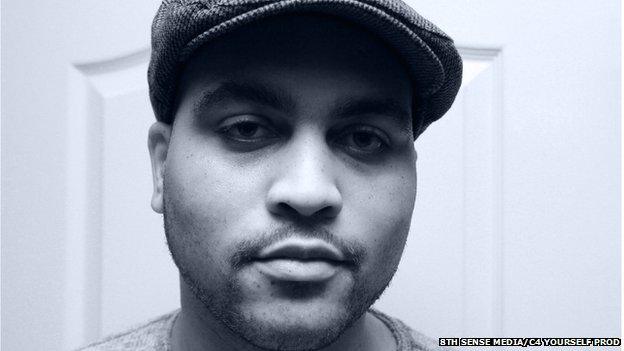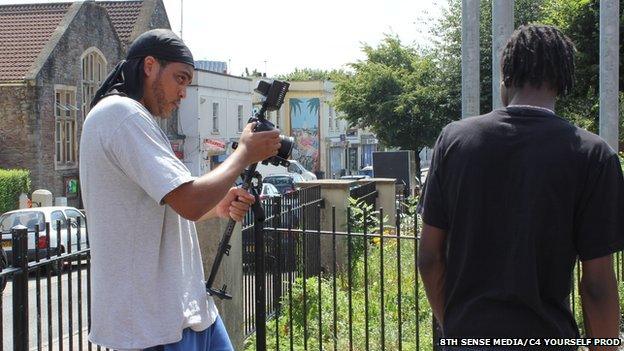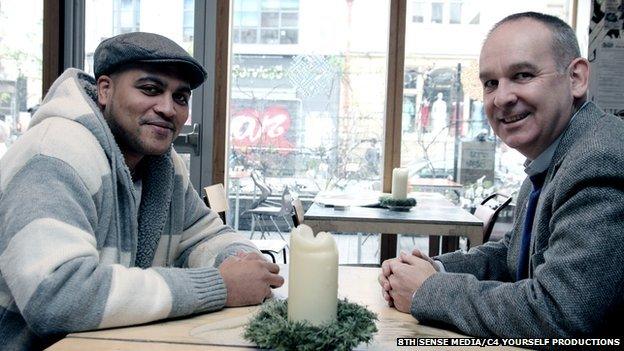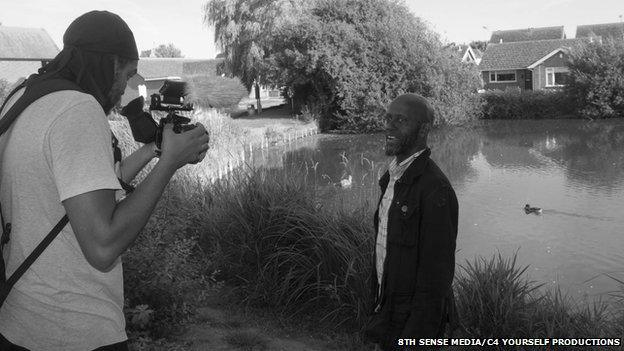Bristol film-maker works with police to improve stop and search
- Published

Michael Jenkins believes "films can change people and can change society"
Self-taught film-maker Michael Jenkins left school at 16. After long spells of unemployment, he approached the Princes Trust for a loan and a mentor. Now one of his films is helping to improve the way Avon and Somerset Police use stop and search powers.
Michael Jenkins, now 27, said during his life, he had been stopped and searched about 20 times. One time he was stopped three times in the same week, which he said "made him hate the police".
It made him an ideal candidate to make a 20-minute documentary exploring the impact of stop and search on communities.
But, Mr Jenkins said, he even faced suspicions while making the film - a sequence that is included in the final version.
It happened outside Southmead police station after he had just interviewed Superintendent Mike Prior, the force's stop search lead at the time.
Mr Jenkins and his colleague were approached by an officer who stopped them and then asked them to wait while he confirmed their story.
He said: "I was doing nothing wrong. It showed me how much I've internalised being stopped by the police. The barrier is still there - even though I was working with them."
Mr Prior said the film had received "great feedback" and the force was now "on track" to introduce body cameras to record stop and searches from this month.
He said: "The film is about challenging people's perception of stop and search and the reality of it - both are equally as important.
"It's vital that we listen and hear the concerns that people have and that is what the film is all about."
In May, six months after the release of the film, the force said it would be inviting residents to review its progress on how it uses stop and search powers.

Michael Jenkins wants to tell the "untold stories"
Where did it begin for Michael Jenkins?
After he dropped out of college, he began making "basic music videos" for local rap groups and "film just clicked".
When his camera broke and he could not afford the £900 needed to fix it, he approached the Princes Trust.
"I looked into it and that got me into thinking about business. It took me a long time, almost a year as the Princes Trust course was full," he said.
And once on the course, it was not plain sailing. He was teamed up with a mentor - self-confessed "old school" retired banker Alan Piper - who was not in the least impressed when Michael Jenkins arrived ten minutes late for their first meeting.

Michael Jenkins said mentor Alan Piper really helped him to focus on setting up his business
On Mr Piper's advice, Mr Jenkins bought a desk diary and was never late again.
Soon afterwards, he set up his company - 8th Sense Media - making films that set out to challenge negative stereotypes. And in 2012, the Princes Trust loaned him about £2,300 to buy a camera.
Mr Piper, who has mentored more than 600 people, said: "Michael stands out. He is confident but not arrogant and a storyteller with a social conscience.
"The great thing about Michael is that he listened. In between meetings he had tackled whatever we had discussed - sometimes challenging, sometimes easy.
"I asked him 'what kind of a filmmaker do you want to be remembered for?' and that will help you and guide you over which jobs you take on and what kind of jobs you don't take on."

Veteran soldier Patrick Cyrus and Jenkins met when they worked together at BCFM community radio in Bristol
Michael Jenkins' latest film Black Soldier, White Army, external - shown at Bristol's Afrika Eye film festival in November - is about a black veteran soldier who served in Northern Ireland.
Other current projects include Darkie Day, which he started filming on 26 December. The film is about a Boxing Day tradition in Padstow in Cornwall where local people "black up", similar to minstrels. Mr Jenkins says he wanted to find out whether it was a "harmless English folk tradition or racism."
He said: "Filming was very interesting and it gave me a mixture of emotions.
"Nonetheless, it has inspired me to follow up on contacts I have made to further investigate this tradition and gain a better understanding."
- Published22 December 2013
